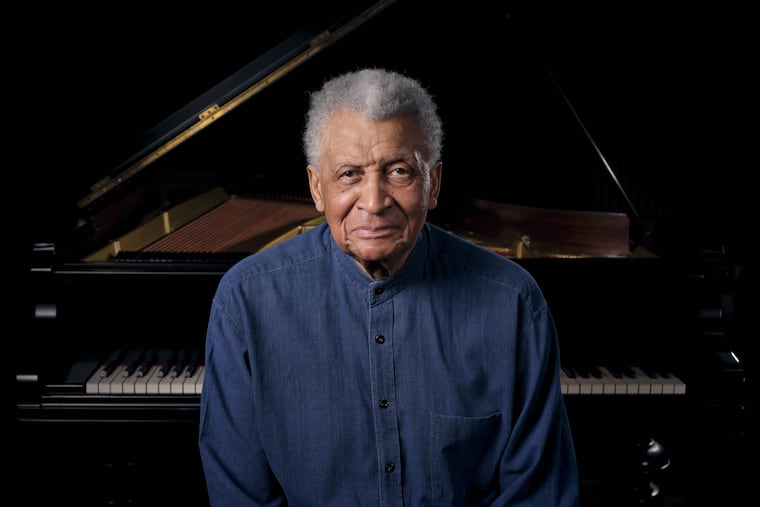Nelson Mandela’s favorite pianist, South African jazz master Abdullah Ibrahim, is bringing his trio to Philly
“Bach? Beethoven? We’ve got better,” Mandela once said of the musician who just turned 90.

Shortly after arriving in New York City in 1965, beginning a decades-long exile from apartheid-era South Africa, pianist Abdullah Ibrahim formed an unusual trio. Instead of the usual piano, bass, and drums lineup, he enlisted Cuban American cellist Calo Scott and Philadelphia avant-garde woodwind player Byard Lancaster on bass clarinet.
Arriving at a Manhattan jazz club for the trio’s first gig, Ibrahim soon learned that his eclectic approach wouldn’t always be appreciated. “They didn’t want to pay us,” the pianist recalled over Zoom from his New York City hotel room. “They said, ‘That’s not a trio!’”
More than five decades later, Ibrahim will perform this Sunday at the Annenberg Center with a similar lineup, featuring longtime collaborator Cleave Guyton on flute, piccolo, clarinet, and saxophone; and Noah Jackson on cello and bass. The new trio, which released the gorgeous double album 3 earlier this year, wasn’t formed as a conscious echo of that earlier group, Ibrahim said. It was simply the latest variation on his lifelong search for different compositional colors, which has led him from exploratory solo piano outings to orchestral performances.
He understands the resistance to a jazz band without a drummer. “Jazz is a community-driven music, and you have to have the beat to synchronize the whole community,” Ibrahim explained. “But the beat is always there, concealed. It could be in the heartbeat and the breath of the individual.”
Long-forgotten club owners aside, the pianist has garnered a number of impressive admirers over the course of his notable career. Legendary pianist and bandleader Duke Ellington mentored Ibrahim, who celebrated his 90th birthday last month. He was invited to perform at Nelson Mandela’s 1994 presidential inauguration.
Asked his impressions of Ibrahim at the time, Mandela replied, “Bach? Beethoven? We’ve got better.”
Now a revered elder and an NEA Jazz Master, Ibrahim still beams when recalling that lofty compliment. “We really miss the spirit of Madiba,” he mused, using the nickname by which Mandela is known in his homeland. “He was quite an incredible person.”
Born in Cape Town in 1934, Ibrahim began his career under the name Dollar Brand before his 1968 conversion to Islam. In the late 1950s, he met trumpeter Hugh Masekela and cofounded the Jazz Epistles, a short-lived but profoundly influential bebop group that played in defiance of the repressive apartheid government.
The Jazz Epistles disbanded in the early ’60s as its members fled the country, with Masekela and Ibrahim both contributing iconic anthems to the antiapartheid movement — the stirring “Mannenberg” in Ibrahim’s case, named for a crime-plagued township created by the destruction of the artist-rich District Six.
After a brief return at the end of the decade, Ibrahim didn’t step foot in South Africa for more than two decades. He made his homecoming in 1990, after Mandela’s release from prison, and now lives in Germany. Throughout his prolific career he has continued to honor his country and its struggle in his music, and performed in support of the African National Congress party despite refusing to become a card-carrying member. (“I don’t even belong to a football club,” he joked.)
Speaking on Tuesday as Americans were lining up at the polls, Ibrahim reflected on the role of music in affecting social change. At an early age, his great-grandfather had tutored the young musician in the use of traditional medicine. He wanted to continue his studies but was barred entry to medical school because of his race.
“My path was to be a healer, from the tradition into contemporary medicine,” he said. “It was disallowed for me to take that path, but I continued to strive for the concept of healing.”
Ibrahim has clearly applied that healing urge to himself, remaining creative and lively at 90. He credits his 60-year study of Japanese philosophy and martial arts, in particular the concept of “mushin” — “no mind.” He described the idea as an ongoing struggle with the ego, which he characterizes as an inner voice known as “The Whisperer.”
“I play a concert and get a standing ovation, and the Whisperer says, ‘Wow, you were fantastic.’ I say to the Whisperer, ‘I can only do this through the grace of God.’ He immediately says, ‘Wow, you’re a very humble person.’ So how do I deal with the ego?”
Ibrahim’s answer is reflected in the compelling, often meditative music that he creates, a tender, fragile, achingly lyrical sound that casts a delicate spell over an audience.
“It is a presentation of the absolute now,” he concluded. “Once I strike a note, there’s nothing I can do. So I have to have all honesty and resolution to strike that note with pure intention.”
Abdullah Ibrahim plays the Annenberg Center, 3680 Walnut St., on Sunday, Nov. 10, at 7 p.m. Tickets and information at pennlivearts.org or 215-898-3900